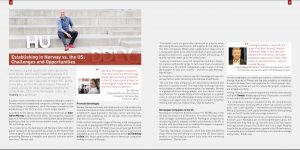NEWS
AmCham News tags
- Accounting / Financial
- AmCham Norway
- Company Profiles
- Education / Research
- Entertainment
- Food & Beverage
- Government
- Healthcare
- Hotel/ Restaurants/ Conferences
- Insurance
- International Leadership Interview Series
- Membership Guide
- Publications
- Rising Leaders
- Technology
- Trade
- Travel
Archive tags
Business News tags
- Accounting / Financial
- Airline / Travel
- Automobile / Transport
- Chemicals / Metals
- Communications/PR/Media
- Culture / Lifestyle
- Defense / Security
- Education / Research
- Energy
- Entertainment & Lifestyle
- Financial / Investment
- Food & Beverage
- Government
- Health
- Human Resources
- Insurance
- IP & Innovation
- Legal
- Management Consulting
- Manufacturing
- Pharmaceutical
- Politics
- Property / Real Estate
- Seafood
- Shipping & Offshore
- Statistics
- Tax
- Technology
- Trade
Establishing in Norway vs. the US: Challenges and Opportunities
Category: AmCham Norway
“Norway is a great country for start-ups in the early phase, particularly regarding access to a talented work-force, but if you want large growth and expansion, start-ups have to think ‘US’. At the same time, and for the same reason, Norway is a great country for large company investments,” Jonas Rinde, CEO at the Norwegian scale-up Huddly tells AmCham in our 2018-19 Membership Guide.
A current norm is that American companies looking to invest in Norway tend to be established companies, looking to gain access in technology or competence, while Norwegian companies are establishing in the US to access a much larger market.
According to Gro Dyrnes, Regional Director Americas at Innovation Norway’s San Francisco Office, US companies regularly approach Innovation Norway when looking learn about Norwegian businesses that can solve various market needs, particularly in the technology sector.
“In our experience, the best way to sell Norway is when well-prepared companies bring something unique to the market that solves a specific and identified need, as well as more generally promoting Norway’s strengths and specific industry sector expertise,” Dyrnes says.
Promote Advantages
Notably, Norway has a well-educated workforce, high productivity, essential international understanding, excellent infrastructure and a highly tech-savvy population. Norway’s senior and mid-management level employees are, on average, more cost-effective than their US counterparts.
In the southern and eastern region of Norway, a mid-management role would on average earn $118,239 annually, whereas an equal level employee on the US West Coast would average $126,655 annually. According to Heming Bjørnå, Senior Commercial Specialist at the US Commercial Service at the US Embassy in Oslo, this factor adds further value to American companies looking to invest in Norway.
“Prohibitive costs are generally referenced as a factor when discussing Norway investments, although we do not really hear this from companies. While some supply factors may come at a marginally higher price, effective production processes and a productive work force, coupled with a market willing to pay for quality, typically make up for the added costs.”
“Looking at statistics, most US companies find their domestic market sufficiently large. In fact, less than one percent of America’s 30 million companies export and of those, 58 % export to only one country – and not usually Norway,” Bjørnå says.
As competition is fierce, industry-specific knowledge and expertise are key factors when attracting international investments.
“We see that most companies are attracted by demand and expertise in specific sectors. This may relate to energy, maritime technologies or defense and aerospace. For example, Norway is a global offshore energy player, and this sector creates opportunities for a wide range of US companies on a global scale.
“A contract with a Norwegian energy company or a service company is an opportunity for an American company to further develop international relationships,” Bjørnå explains.
Norwegian Companies in the US
Norwegian companies directly account for 80,000 jobs in the US and are present in all 50 states. Innovation Norway, which aims to trigger sustainable growth for Norwegian companies by introducing them to relevant markets and networks in the US, is familiar with assisting small to medium Norwegian companies looking to establish across the Atlantic.
“Typically, Norwegian companies, when they have reached the stage where they are looking to expand to the US, have a great product or technology but require local sales and marketing competence,” Dyrnes says.
She also highlights the healthcare industry, maritime industry, energy, Internet of Things and big data analytics as industries for which Norway has a vast potential for future growth internationally, as these are sectors where Norwegian companies are already excelling.
Having recently announced an agreement with the international tech giant Google, Huddly agrees that a US presence is essential to succeed in the world’s largest market.
“If a company is looking to establish in the US, local presence is vital to be taken seriously. When a start-up reaches a certain point – the “scale-up phase” – investments are normally required. With a US presence, both capital and being able to show growing sales in the US market will encourage investors.”
“While the Norwegian government can certainly improve conditions for start-ups in Norway, such as removing the start-up tax, it is essential that they help set up channels and assist Norwegian start-ups establishing in the US when the time is right.
“Reaping those fruits, by utilizing competence gained in the US marketplace, is invaluable and contributes immensely to increased knowledge and growth,” Rinde says.
Source: AmCham



